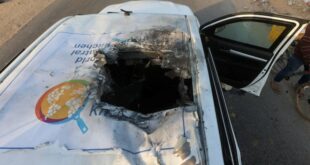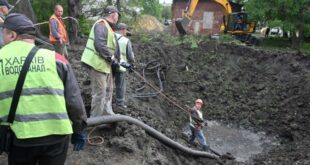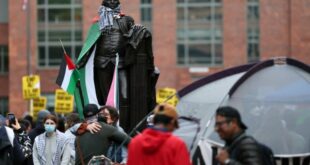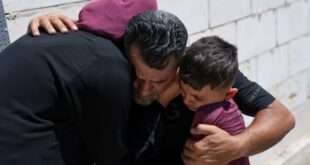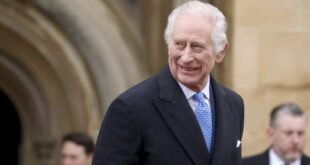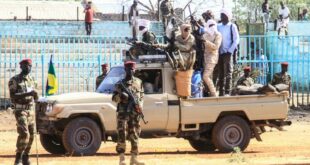Monday saw a gag order warning and reported dozing — but no jurors seated

On most days, Bajia Reed teaches American history. On Monday morning, she felt like she was living it.
She showed up for jury duty outside the courthouse in lower Manhattan, wondering if she'd be on the massive jury pool for Donald Trump's criminal trial.
It's the first criminal trial of a sitting or former U.S. president and may be the only such case heard before the November presidential election.
But there's a more immediate challenge: finding impartial jurors for a case involving a man who leaves few people indifferent.
"I think this is American political history," Reed said as she lined up on the sidewalk, just behind a row of scores of television cameras from outlets around the world.

Divided crowd gathers outside Trump's criminal trial
12 hours ago
People outside the New York courthouse where Donald Trump's criminal trial began jury selection expressed differing stances on whether the former U.S. president is receiving fair treatment from the justice system.
"It is the moment to test what our founders really crafted in our founding documents. We need those to be true, and we need to hold him to every letter of the law."
The statistical odds are low of her making the final cut of 12 jurors, plus alternates. And that's not just because she was among hundreds at the courthouse Monday, or because of her teaching duties on the Upper East Side.
Another complicating factor? She has a clear opinion on the Trump case: "Oh, he's totally guilty."

Prospective jurors strained to get a glimpse of the famous defendant as they filed into the courtroom. One seated near the back giggled and put her hand to her mouth.
Of the first 96 potential jurors brought into the courtroom, more than 50 raised their hand to indicate they couldn't be partial in this trial.
Several dozen of Monday's candidates remain under consideration, but by day's end, none were officially seated; the process continues Tuesday.
A reporter heard one prospective juror, a young woman, leaving the courtroom saying, "I just couldn't do it."
Unique challenge
There's also the unique challenge of this case, involving Trump's payments to a porn star paramour to keep her silent about their affair.
Trump is accused of committing 34 state felonies by paying Stormy Daniels to stay silent during the 2016 election, and hiding those payments, in violation of election-spending laws.
The case may ultimately hinge on whether he actually intended to skirt any of those election-spending laws, but that's an issue for later.
Jury selection is expected to last one or two weeks, with the bulk of the trial likely lasting through most of the spring.
This means Trump will be tethered to Manhattan for the four days a week the court sits (Monday, Tuesday, Thursday and Friday) instead of criss-crossing the country campaigning.
Gag order warnings, reported dozing
Jury selection didn't start immediately on Monday. Initially, the sides debated numerous motions, including what was admissible as evidence.
The judge gave wins to both sides. He refused the prosecution's bid to show the notorious Access Hollywood tape from 2016 where Trump described groping women's genitals; he did, however, allow a transcript of the tape.
In the most dramatic moment of the morning, Trump was warned that he could be jailed if he misbehaves. Justice Juan Merchan asked if he understood that he could be arrested if he disrupts the proceedings, fails to appear at trial or violates bail rules.
Trump responded yes.

In fact, Trump is already being accused of violating a gag order by trashing various parties in the case on social media. Prosecutors sought a $1,000 fine for each of three alleged violations; a contempt hearing was set for April 23.
An unmoved Trump unloaded on the judge again after Monday's hearing. He expressed anger that he would not be excused to attend his youngest son Barron's high school graduation or a U.S. Supreme Court hearing on presidential immunity, pertinent to his separate federal cases.
"It's a scam," he said.
Other moments were less dramatic. Trump was described as appearing asleep at one point by several journalists in the courthouse, who also shared notes with colleagues.
One of the reporters, Maggie Haberman of the New York Times, described his jaw falling open and his head dropping into his chest.
A limited number of news reporters were allowed in the courtroom, and in an overflow room equipped with a TV; the trial is not being broadcast.
Finally, after lunch, the first batch of potential jurors was allowed into the courtroom. There were 96 in that group, and hundreds more could be called.
Trump stared at the judge as he addressed the potential jurors. Occasionally his eyes shifted toward the jury box, where some were seated.
'Proud to be here': Trump
Trump and his allies seemed intent on transforming the courthouse into their virtual campaign stage. Pro-Trump celebrities were outside the courtroom, determined to turn the lemons of his legal travails into political lemonade.
They denounced his alleged persecution, as did Trump himself when he paused to speak to TV cameras in the courthouse hallway.
"It's an assault on America," Trump said. "And that's why I'm proud to be here…. I'm very honoured to be here."

If he was proud to be there, he hasn't been acting like it in recent months, as he repeatedly tried quashing the case, and getting the judge, Merchan, dismissed because of his daughter's political work for Democrats and his own $35 in donations to Democrats.
The judge swatted away yet another request for him to recuse himself. Merchan fumed that the court was being "inundated" with motions he called "close to frivolous, if not frivolous."
Out in the street, an anti-Trump protester voiced what appears to be the majority view of legal and political analysts entering the case.
That view is that Trump, if convicted, is unlikely to be sent to jail for crimes that carry a maximum of four years per count.
"Oh no. But he'll be a felon," said Tim Smith, an artist from Pennsylvania who sells works from outside Trump court appearances, holding up a poster that said, "Loser."
And if he's a felon, Smith said, that might hurt the re-election chances of a man he views as an anti-democratic, anti-American, budding dictator. Some polls have suggested a guilty conviction could shave a few points off of Trump's support.
"Which will hopefully affect voter-base turnout," Smith said.
Searching for unbiased jurors in Manhattan
Given the political overtones of the case, it's no surprise that politics will be part of the jury selection process.
Jurors will have to fill out a questionnaire. It asks dozens of questions including about their opinions related to Trump, and this case, what media they read and what books they might have read from parties connected to the case.
Trump's challenge here is finding unbiased jurors in Manhattan, where most people have a clear opinion on him — and it's overwhelmingly negative.

Trump's defence has opportunities at trial — and on appeal, if necessary
18 hours ago
Star witness Michael Cohen is problematic and prosecution's theory is unique, former federal prosecutor Joseph Moreno says
Democrats outnumber Republicans nine to one in this county, and it's why he tried moving the case to the suburbs; that gambit failed, as this county is where he lived, and where key facts of the case unfolded.
"The beliefs of the people judging you are always critical and often more important than facts," said Tim Bakken, a New York lawyer, former prosecutor and law professor at the U.S. Military Academy at West Point.
"The Trump team must find jurors who have the mental strength to reject their political leanings, ironically in a politically charged case, and trust that only the law should guide them to a verdict."
Early predictions
But Trump has one major statistical advantage: the prosecution needs a unanimous decision for a conviction; he doesn't.
"They only need one juror to acquit," said Mark Cohen, a long-time New York criminal defence and prosecution lawyer.
He said politics won't be the only factor in picking jurors. The prosecution and defence will also weigh personal traits, Cohen said.
For example, he said, the prosecution will look for people who've made difficult decisions in their professional or personal lives. The defence will look for independent-minded people, capable of rejecting a herd mentality.
"I do expect it'll move rather quickly," Cohen said, predicting a smoother process than some others do.
"[It'll take] a few days — maybe a week on the outside."
And then there's the trial.
Prospective New York City juror Reed made her own predictions before entering the courthouse Monday to learn her assignment.
She says she thinks Trump stands an excellent chance of being elected president again. And she doesn't foresee a conviction here, saying she has little faith in the system.
"No, I don't," she said, before being ushered by police into the courthouse. Motioning to the row of TV cameras, she said: "This — all of this — it's just political theatre. It's theatre.
"But at least he will go through the process."

Trump hush money trial picks zero jurors on first day
6 hours ago
Dozens of prospective jurors were dismissed promptly on the first day of Donald Trump's hush money trial. Lawyers have begun the difficult process of selecting 12 jurors and six alternates who can be fair and impartial in this historic case.
ABOUT THE AUTHOR
Alexander Panetta is a Washington-based correspondent for CBC News who has covered American politics and Canada-U.S. issues since 2013. He previously worked in Ottawa, Quebec City and internationally, reporting on politics, conflict, disaster and the Montreal Expos.
With files from The Associated Press
*****
Credit belongs to : www.cbc.ca
 MaharlikaNews | Canada Leading Online Filipino Newspaper Portal The No. 1 most engaged information website for Filipino – Canadian in Canada. MaharlikaNews.com received almost a quarter a million visitors in 2020.
MaharlikaNews | Canada Leading Online Filipino Newspaper Portal The No. 1 most engaged information website for Filipino – Canadian in Canada. MaharlikaNews.com received almost a quarter a million visitors in 2020.


